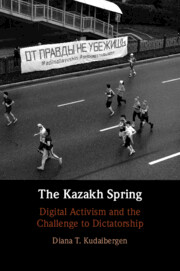Book contents
- The Kazakh Spring
- The Kazakh Spring
- Copyright page
- Dedication
- Contents
- Figures
- Tables
- Acknowledgements
- Introduction
- 1 What Is the Kazakh Spring?
- 2 Who Are Oyan, Qazaqstan?
- 3 Deconstructing Vlastʼ
- 4 Performing the State, Performing the Protest
- 5 Generation Q and Decolonizing Alash
- 6 The Public Square and the Body under Authoritarian Pressures
- 7 Queering the Public Sphere
- 8 Making Sense of the Bloody January 2022 Mass Protests
- Conclusions
- References
- Index
5 - Generation Q and Decolonizing Alash
Published online by Cambridge University Press: 16 May 2024
- The Kazakh Spring
- The Kazakh Spring
- Copyright page
- Dedication
- Contents
- Figures
- Tables
- Acknowledgements
- Introduction
- 1 What Is the Kazakh Spring?
- 2 Who Are Oyan, Qazaqstan?
- 3 Deconstructing Vlastʼ
- 4 Performing the State, Performing the Protest
- 5 Generation Q and Decolonizing Alash
- 6 The Public Square and the Body under Authoritarian Pressures
- 7 Queering the Public Sphere
- 8 Making Sense of the Bloody January 2022 Mass Protests
- Conclusions
- References
- Index
Summary
This chapter dwells further on the collective solidarity and imagined digital community that the Kazakh Spring was able to bring about. In this chapter, I discuss the use of language, colonial heritage, and the rethinking of its legacy in the context of the nationalizing regime of Nazarbayev. I argue that the constructed divide between the Kazakh- and Russian-speaking political audiences no longer works as a divide for the Kazakh Spring activists, who are actively embracing bilingualism not as an unattainable aspiration but as a living reality of post-independence. Kazakh Spring activists can also be dubbed the Generation Q as they strive to return to the Latinization of the Kazakh/Qazaq language. This chapter also discusses how activists read the decolonial theory and use it in their activism. I dwell on why the main slogans, names, and titles of their projects come from the oeuvre of the Kazakh pre-Soviet movement of Alash and its writers and how these well-known discourses are changed and adapted to the contemporary Qazaq realities. I also discuss how the Kazakh Spring as a field allows the rethinking the nationalistic stigma that remained a Soviet legacy.
Information
- Type
- Chapter
- Information
- The Kazakh SpringDigital Activism and the Challenge to Dictatorship, pp. 169 - 193Publisher: Cambridge University PressPrint publication year: 2024
